
Whether you’re a seasoned investor looking to expand your portfolio or a first-time flipper exploring real estate investment opportunities, this comprehensive guide will help you learn more about the process of buying REO properties, including how properties end up in foreclosure and how foreclosure impacts the status of a property.
We’ll also help you discover financing options for purchasing REO properties to maximize your investment potential. So, what exactly are REO properties, and why should you consider adding them to your investment portfolio?
Real Estate Owned (REO) Property Explained
A Real Estate Owned (REO) property is a type of real estate that has been foreclosed upon by a lender, typically a bank or mortgage lender, due to the borrower’s failure to make mortgage payments. When a property owner defaults on their mortgage, the lender initiates foreclosure proceedings to take possession of the property.
After the foreclosure process is complete and the property is repossessed by the lender, it becomes what is known as an REO property. Essentially, the lender becomes the owner of the property and assumes responsibility for its sale at an auction.
Understanding Real Estate Owned (REO) Properties
REO properties are often sold by lenders in an attempt to recoup as much of the outstanding mortgage debt as possible. These properties are usually considered distressed properties and are sold “as-is,” meaning the lender does not make any repairs or improvements before selling. As a result, REO properties can sometimes be purchased at a discount compared to similar properties on the market.
Investors interested in purchasing an REO property should be aware that the process can be more complex than buying a traditional home. Additionally, there may be certain risks involved, such as the property needing extensive repairs. However, with careful research and due diligence, buying an REO property can present an opportunity for investors to acquire real estate at a potentially favorable price.
Once the lender takes ownership of the property through foreclosure, they assume responsibility for addressing any outstanding debts, taxes or liens associated with the property before listing it for sale as an REO. This proactive approach helps expedite the sale process and ensures a smooth transfer of ownership.
How a Property Gains REO Status
The process by which a property becomes REO typically follows a few steps:
- Loan default. The process begins when a property owner defaults on their mortgage payments. This could happen due to financial hardship, job loss, or other reasons that prevent the borrower from meeting their loan obligations.
- Foreclosure. After a certain period of missed payments, the lender initiates foreclosure proceedings (the legal process through which the lender seeks to take ownership of the property to recover the outstanding debt).
- Notice of default. The lender issues a Notice of Default (NOD), informing the property owner that they are in default on their mortgage and providing a period during which they can cure the default by paying the overdue amount.
- Foreclosure sale. If they’re unable to cure the default within the specified period, the lender schedules a foreclosure sale (also known as a sheriff’s sale or trustee’s sale). This is a public auction where the property is sold to the highest bidder, typically for an amount that covers the outstanding debt.
- Ownership transfer. If the property does not sell at auction, it becomes Real Estate Owned (REO), meaning it is now owned by the bank or mortgage lender.
- Listing for sale. The lender may choose to sell the REO property, usually through real estate agents or specialized REO asset managers, to recoup as much of the outstanding debt as possible.
Financing REO Properties
When purchasing an REO property, investors often encounter financing challenges. For example, traditional lenders may be hesitant to finance REO properties due to their condition (they may be derelict). In such cases, investors may turn to alternative financing options, such as hard money loans from private lenders.
Hard money loans (in this instance for REO property loans) are often used by real estate investors seeking quick financing for properties that may not qualify for conventional loans, especially those in need of significant repairs. Private lenders such as HCS Equity are typically more flexible in their lending criteria and may be willing to finance properties in poor condition.
REO property loans are short-term, asset-based loans, and unlike traditional mortgages, they’re based on the value of the property rather than the borrower’s creditworthiness or financial history.
At HCS Equity we often complete the loan approval process within 4-6 business days. Our loans typically have a term of 12 months, which gives borrowers enough time to make any necessary repairs and sell it in the case of a fix and flip.
Contact HCS Equity to Get a REO Property Loan
Are you considering buying a Real Estate Owned (REO) property but unsure about financing options? Look no further than HCS Equity. As experts in providing financing solutions for real estate investors, HCS Equity specializes in offering REO property loans tailored to your specific requirements.
While REO properties can be high-risk investments, they also offer the potential for high rewards. By conducting thorough due diligence, seeking expert guidance, and exploring favorable financing options such as those offered by HCS Equity, investors can quickly purchase real estate below market value, potentially leading to significant profits upon resale or rental income.
Get in touch with HCS Equity and secure an REO/distressed property loan.










